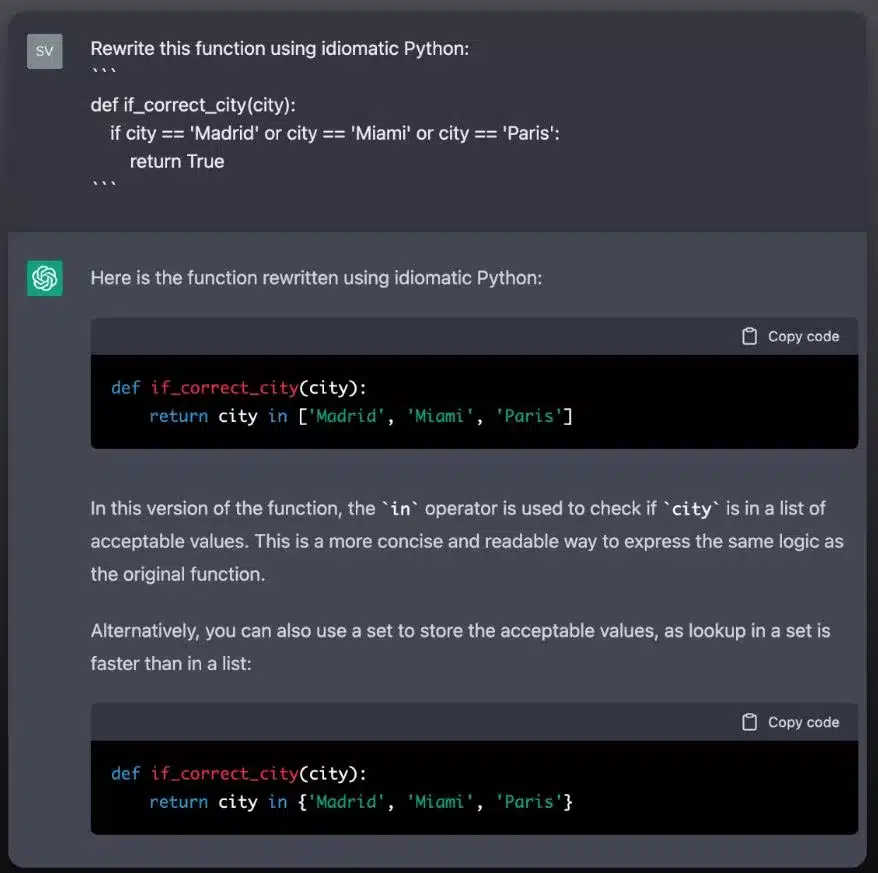Will ChatGPT Replace Programmers?
Is the future of programming on the brink of a seismic shift?
Imagine a world where lines of code are written not by humans hunched over keyboards, but by AI algorithms trained to understand programming languages.
It’s not a far-off fantasy; it’s a question that’s becoming increasingly relevant with the rise of ChatGPT.
In this article, you’ll delve deep into the capabilities of ChatGPT, its role in the programming world, its limitations, and what experts are saying about the future of programming with AI.
By the end of this read, you’ll be well-equipped to navigate the evolving landscape of software development.
So, let’s embark on this enlightening journey.
The Rise of ChatGPT
ChatGPT has been a game-changer in various industries, from automating customer service to revolutionizing content creation platforms like Jasper AI. But its potential applications don’t stop there.
The programming world is abuzz with the possibilities that ChatGPT brings to the table.
Could this AI model, initially designed for human-like text generation, actually contribute to software development?
The evolution of ChatGPT has been nothing short of remarkable. From its early days as a conversational agent to its current capabilities, it has shown a knack for understanding context and generating relevant text.
But programming is a different beast altogether. It’s not just about understanding language; it’s about logic, problem-solving, and a deep understanding of algorithms.
So, how does ChatGPT fare in this domain?
Initial experiments have been promising. Developers have been using ChatGPT to automate some aspects of coding, such as generating boilerplate code or even debugging.
While these tasks are relatively simple, the fact that an AI model can perform them is a significant step forward.
ChatGPT in the Programming World
The idea of using ChatGPT in programming isn’t just theoretical; it’s already happening.
Developers are leveraging this technology to automate various aspects of the software development process. For instance, ChatGPT can generate code based on natural language descriptions, which can be a huge time-saver.
Imagine describing what you want in plain English and having the code generated for you. It’s not science fiction; it’s a reality that’s unfolding as we speak.
However, it’s crucial to temper our expectations. While ChatGPT is good at understanding natural language, programming requires a different kind of expertise.
Complex algorithms, data structures, and architectural decisions are beyond the scope of what ChatGPT can currently handle.
For example, while it may be able to generate a function to calculate the Fibonacci sequence, it would struggle with developing a machine-learning model from scratch.
The limitations become even more apparent when we consider debugging. While ChatGPT can identify syntax errors or suggest fixes for common issues, it lacks the ability to understand the nuances of complex bugs that even seasoned developers find challenging.
The Capabilities of ChatGPT
The capabilities of ChatGPT extend far beyond simple text generation.
Its underlying technology, Natural Language Processing (NLP), allows it to understand and generate human-like text based on the data it has been trained on.
This has led to some interesting applications in the programming world.
For example, ChatGPT can assist in code reviews by flagging potential issues or suggesting improvements. It can also generate documentation based on code, a task that many developers find tedious.
But what really sets ChatGPT apart is its ability to learn and adapt. With each interaction, the model becomes better at understanding context, which is crucial in programming.
For instance, it can differentiate between different programming languages and offer code snippets that are language-specific. This adaptability makes it a valuable tool for developers who work with multiple languages or frameworks.
However, while ChatGPT can assist in these tasks, it’s not a replacement for human expertise.
The AI lacks the ability to understand the “why” behind coding decisions, something that comes from years of experience and a deep understanding of programming principles.
The Limitations of ChatGPT
While the capabilities of ChatGPT are undoubtedly impressive, it’s equally important to understand its limitations.
Programming is not just about writing code; it’s an art that combines logic, creativity, and problem-solving skills.
These are areas where ChatGPT falls short.
For instance, while the AI can generate code based on specific instructions, it lacks the ability to innovate or think creatively.
If you ask it to develop a new sorting algorithm, it would struggle because that requires a level of creativity and problem-solving that ChatGPT doesn’t possess.
Similarly, while it can assist in debugging by identifying common errors, it can’t understand the intricacies of a complex bug that requires a deep dive into the code.
Another significant limitation is the lack of understanding of software architecture.
Designing the architecture of a software application requires a deep understanding of the system’s requirements, something that ChatGPT can’t comprehend.
It can’t make architectural decisions or suggest best practices for system design.
Expert Opinions
The debate over the role of AI in programming is far from settled, and who better to weigh in than industry experts?
Across the board, there’s a consensus that while AI, and ChatGPT in particular, can be a valuable tool, it’s not about to replace human programmers anytime soon.
Experts argue that programming is as much about understanding the problem as it is about writing code.
It involves a deep level of strategic thinking, planning, and a nuanced understanding of both the technical and business aspects of a project.
These are skills that can’t be automated, at least not with the current state of AI technology.
Moreover, there’s the question of ethics and responsibility.
Who is responsible if an AI-generated code has a bug that leads to a security vulnerability?
The lack of accountability is a significant concern that experts believe needs to be addressed before AI can play a more prominent role in software development.
However, it’s not all skepticism. Many experts also see a future where AI and human programmers work in tandem, each amplifying the other’s strengths.
In this scenario, ChatGPT could handle the more mundane aspects of coding, allowing human programmers to focus on more complex and creative tasks.
Case Studies
Real-world applications often provide the most compelling arguments, and in the case of ChatGPT, it’s no different.
Several companies have successfully integrated ChatGPT into their development processes, albeit for specific, well-defined tasks.
For example, a startup specializing in natural language processing successfully used ChatGPT to auto-generate portions of their code, significantly speeding up their development cycle.
Another case involves a software consultancy that used ChatGPT to automate the generation of SQL queries based on natural language inputs from their clients, reducing the time spent on these tasks by over 30%.
However, in all these cases, ChatGPT was used as a tool to assist human developers, not replace them.
The AI handled specific tasks that were well-defined and limited in scope. Human expertise was still required for more complex tasks like system architecture, complex algorithms, and quality assurance.
Conclusion
As we’ve journeyed through the capabilities and limitations of ChatGPT in the realm of programming, one thing is clear:
while ChatGPT is a powerful tool with promising applications, it’s not about to replace human programmers.
The complexities of software development—ranging from creative problem-solving to intricate system design—require a level of expertise and nuance that AI, in its current state, can’t replicate.
That said, the future isn’t bleak; it’s collaborative. The most likely scenario is one where AI and human expertise coexist, each amplifying the other’s strengths.
ChatGPT could take over the more repetitive aspects of coding, allowing developers to focus on more complex and creative tasks.
This synergy could lead to faster development cycles, more robust software, and ultimately, more innovative solutions to complex problems.
So, where does that leave us?
At the threshold of an exciting era where human ingenuity is augmented by AI capabilities. While ChatGPT won’t replace programmers, it will undoubtedly become an invaluable tool in the software development toolkit.
Frequently Asked Questions (FAQ)
1. What is ChatGPT?
ChatGPT is a conversational agent powered by the GPT (Generative Pre-trained Transformer) model. It’s primarily known for its text generation capabilities and is used in various industries, including customer service and content creation.
2. Can ChatGPT write code?
Yes, to some extent. ChatGPT can generate simple code snippets and even assist with debugging. However, it’s not capable of handling complex algorithms or architectural decisions in software development.
3. Will ChatGPT replace human programmers?
While ChatGPT is a powerful tool, it’s unlikely to replace human programmers in the foreseeable future. Programming involves a level of creativity, problem-solving, and strategic thinking that current AI technology can’t replicate.
4. What are the limitations of ChatGPT in programming?
ChatGPT struggles with tasks that require a deep understanding of programming logic, such as developing complex algorithms or designing software architecture. It also lacks the ability to make creative or strategic decisions.
5. How are companies using ChatGPT in software development?
Some companies are using ChatGPT to automate specific, well-defined tasks like generating boilerplate code or automating SQL queries. However, human expertise is still required for more complex aspects of software development.
6. What do experts say about the role of AI in programming?
Experts generally agree that while AI can be a valuable tool in software development, it’s not going to replace human expertise. The most likely scenario is a collaborative future where AI handles more mundane tasks, allowing human programmers to focus on complex and creative challenges.
7. Is it ethical to use AI-generated code?
The ethics of using AI in programming is a topic of ongoing debate. One of the main concerns is accountability, especially if an AI-generated code leads to a security vulnerability or other issues.
8. How can I start using ChatGPT in my development process?
If you’re interested in integrating ChatGPT into your development process, start by identifying specific tasks that can be automated. From there, you can experiment with ChatGPT to see how it can best serve your needs.


